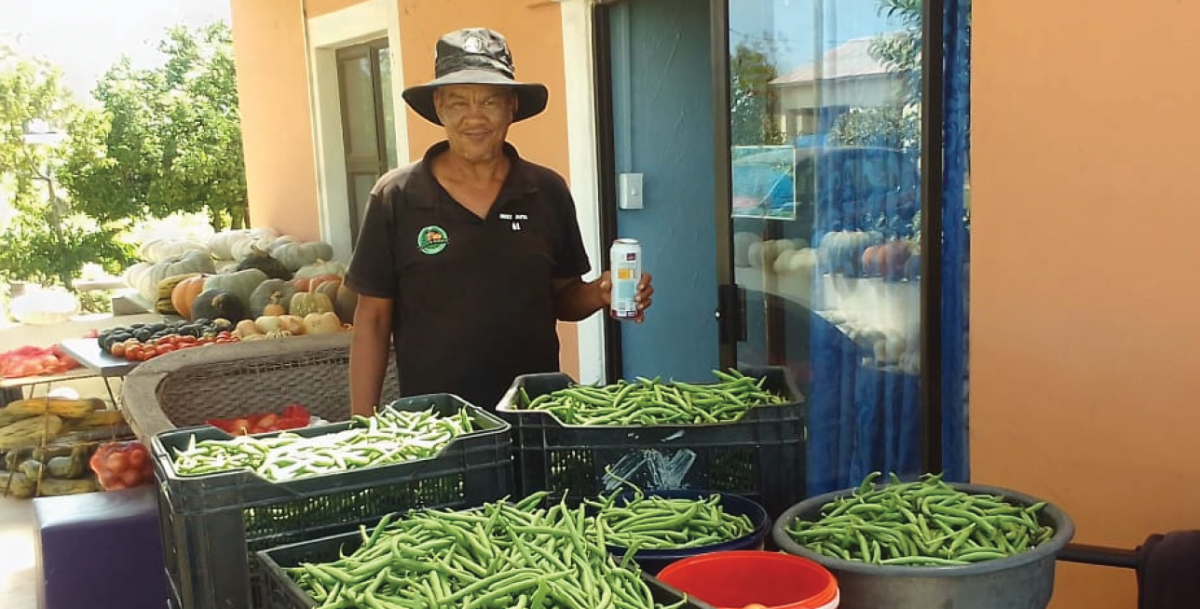When President Cyril Ramaphosa announced the introduction of the Special Covid-19 Social Relief of Distress (SRD) to cushion South Africans from the devastating effects of the pandemic, the crisis marked a turning point for 61-year-old Nick Jafta from De Novo, Kraaifontein — a small town on the north-eastern outskirts of Cape Town.

Faced with the economic standstill of the COVID-19 pandemic, out of his trucking job and unable to take up the usual jobs, Jafta made a decision that would change his life.
“I was not working and I decided that I must do something to earn extra money,” he recalls. “That’s how I started with this business.”
Armed with little more than determination and his R350 at the time, he planted the seeds of what would become a thriving vegetable farming business.
Today, Jafta operates a flourishing micro-farm that supplies spinach, green beans, onions, potatoes, butternut, and squash to households across De Novo, as well as in Worcester, Stellenbosch, and Cape Town. His green beans are especially popular, and last year, he proudly harvested over 500 pumpkins as well.
Jafta lives with his wife, a pensioner who helps him with the farming work. “It’s a lot of work,” he admits.
“I wake up at 4am to plan my day and start working.” Despite the challenges, he remains optimistic.
“The community supports me. It’s not a big place — we’re about 80 households — but they’re always buying from me.”
His commitment and resilience caught the attention of the South African Institute for Entrepreneurship (SAIE), which awarded him a certificate through its Backyard Food Garden Training Programme in 2023. “Those [SAIE] guys helped me a lot,” said Jafta.
“They gave me advice on planning, how to manage my books… they really walked with me through the journey.” Last year, Jafta made a turnover of about R20,000. He reinvests much of it back into his business. “I divide my earnings into three — household needs, reinvestment, and a bit of profit. It’s not much, but I have a plan.”
Building a proper garden structure
Jafta dreams of building a proper garden structure, hiring his first employee, and fencing the area to protect his crops.
As he gets older, the physical demands of farming are becoming more challenging, and having an extra pair of hands would ease the load — especially when it comes to carrying heavy equipment and managing larger plots.
Right now, he borrows tools — often at a cost — and struggles with accessing the resources he needs to grow. “If I could get help from the government or private donors, I would ask for small-scale farming equipment and fencing. That would make a huge difference,” he said.
Jafta’s operation has expanded dramatically. In 2023, he cultivated a 100-square-metre plot. Now, he’s working on a 200-square-metre piece of land granted to him for farming by the government.
Get up and do something
For others facing hardship — especially the youth — Jafta has a clear and heartfelt message: “Get up and do something — even if it’s small.”
He believes that young people, in particular, have the energy and potential to create change in their own lives and communities.
That’s why he’s planning to start a social media account dedicated to teaching others how to grow their own food, hoping to inspire and equip the next generation with practical skills for self-reliance and entrepreneurship.
Precious Mupenzi is a Deputy Director: Internal Communication for the Department of Social Development.
Contact South African Institute for Entrepreneurship
on 021 447 2023 or email: info@entrepreneurship.co.za.
To contact Nick Jafta call: 084 334 4747
Letters
Good day,
I hope this letter finds you well. My name is Isaac Mzobe, and I am reaching out to enquire about potential funding opportunities for entrepreneurs with disabilities.
I am physically disabled and have developed a business idea that will not only provide me with a sustainable income but could also create employment opportunities for other people with disabilities in my community.
Thank you for your time and consideration.
Kind regards,
Isaac Mzobe
Reply
Good day Isaac,
Thank you for your letter – we are inspired by your entrepreneurial spirit.
The government offers a number of funding schemes that prioritise disabled entrepreneurs:
1. The Amavulandlela Funding Scheme – Offered by the Small Enterprise Development and Finance Agency (Sedfa, formerly Sefa). This scheme provides South African persons with disabilities the opportunity to participate in the mainstream economy by accessing credit facilities ranging from R50,000 up to a maximum of R15 million to establish qualifying entrepreneurial enterprises.
You can contact the Sedfa Contact Centre on 086 010 3703 / 012 748 9600, or visit www.sedfa.org.za for more information.
2. The Department of Small Business Development (DSBD) – This department supports small businesses, with a focus on women, youth, and persons with disabilities.
For more information, visit www.dsbd.gov.za, call 0861 843 384, or email info@dsbd.gov.za.
3. The National Youth Development Agency (NYDA) – When applying for funding from the NYDA, simply indicate your disability on the application form.
For more details, visit www.nyda.gov.za, call 0800 58 58 58, WhatsApp 064 758 5058, or email info@nyda.gov.za.
Wishing you all the best in your business endeavours.
Kind regards,
Vuk’uzenzele Newspaper



 Facebook
Facebook Twitter
Twitter WhatsApp
WhatsApp